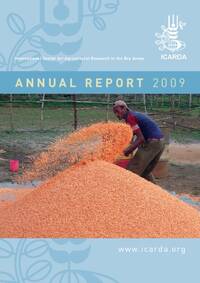ICARDA Annual Report 2009

Authors:
The dry areas face severe challenges to sustainable development. The biggest challenges – food insecurity, water scarcity, land degradation, and climate change – are closely inter-related. The effects of climate change will be felt globally, but the dry areas will be particularly hard hit. Climate change will exacerbate water scarcity, rainfall variability, and the decline in the natural resource base, and thus could have a profound impact on food security.
Food security and climate change have become priority issues for decision makers. The scientific community must play a leading role in finding solutions – providing farmers with new technologies, and policy makers with better information. ICARDA has a clear focus and, over the last three decades, has conducted successful research in dry areas, developing technologies to improve food security despite water scarcity and climate variability and change.
This report highlights some of the successes achieved by the Center and its partners in addressing these issues. Effective partnerships with national research programs, and generous support from donors, has helped the Center reach farmers, policy makers and other stakeholders, and contribute to poverty reduction and improvements in food and nutritional
security.
The year 2009 saw a major expansion of ICARDA's work in both Africa and Asia. A new office was opened in Ethiopia in October. Building on ICARDA's longstanding partnership with the Ethiopian Institute of Agricultural Research, the office will provide support for collaborative activities in Ethiopia and other countries in sub-Saharan Africa. In China, a new Center of Excellence for Dryland Agriculture was established jointly by the Chinese Academy of Agricultural Sciences, ICARDA and the International Crops Research Institute for the Semi-Arid Tropics (ICRISAT). The first coordination meeting of ICARDA's
Regional Program for South Asia and China, held in December, highlighted the strong national support from every partner country – Bangladesh, Bhutan, China, India, Nepal and Pakistan – and the need to further expand collaborative research.
Partners from 35 countries attended ICARDA's biennial Presentation Day in May 2009. The program included presentations by guest speakers, who discussed potential responses to the multiple crises (food-related, environmental, financial and others) faced by developing countries, and the implications of climate change for agriculture in the dry areas.
